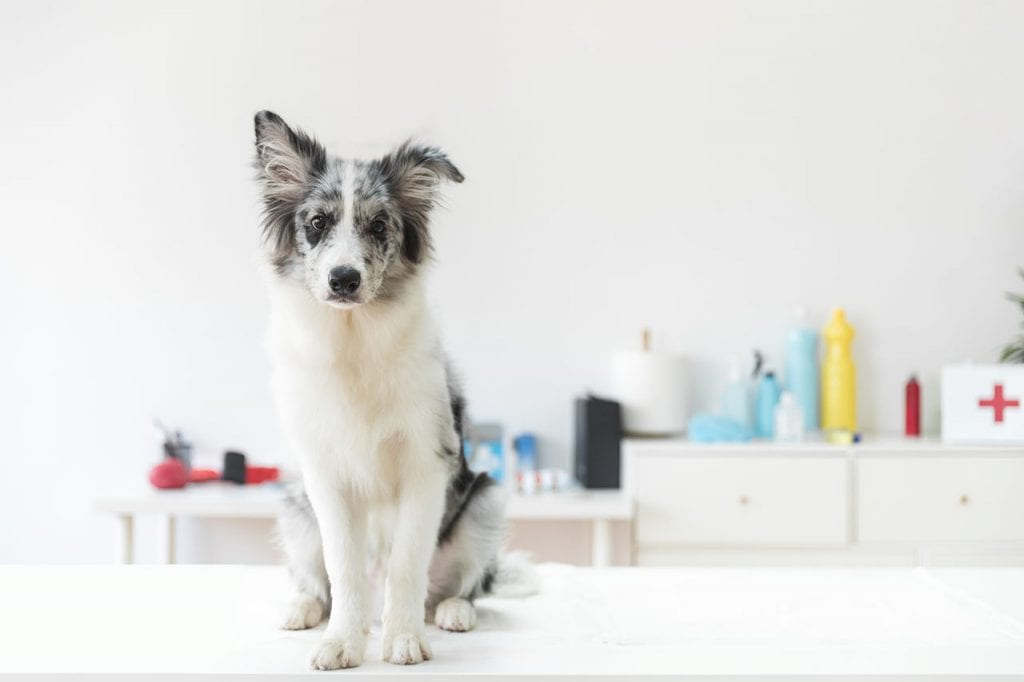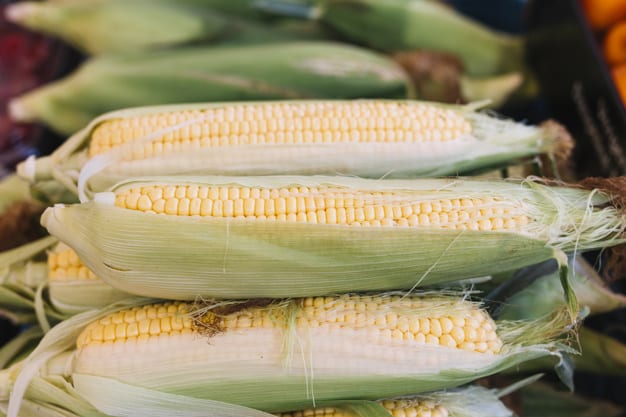Some condemn corn as a quite toxic food for dogs while others insist on its numerous health benefits. So, what should you believe? What is the truth about corn for dogs? Is Corn good or bad for their health?
Can Dogs Have Corn?
Nearly anyone knows a thing or two about corn or maize. It is one of the favorite cereal grains around the world and boasts many nutritious ingredients like minerals and vitamins.
Corn on the cob, canned corn, and even corn in the form of chips and tortillas are among the top ingredients extensively used in many different cuisines.
For centuries, humans and their animals have relied on this cereal grain as an excellent source of essential fatty acids for healthy coat and skin, lutein, beta-carotene, vitamin E, and many other nutrients.
Highly beneficial and healthy it is, but how about dogs? Is it safe to feed them a few amounts of it?

Can Dogs Eat Corn?
Yes, corn is generally safe to eat by dogs (as long as he is not allergic to it). Most commercial dog foods include corn as their main ingredient. However, of course, there are specific rules you will have to adhere if you want to share some of it with your dog.
Similar to other human foods that are safe to eat by dogs, you should not overfeed him with corn because potential health issues may arise, such as digestive problems. Moderation is still imperative.
Read – Healthy Homemade Dog Food Recipes
Can Puppies digest corns?
Well, yeah. Dogs can easily digest the corn, and that is according to recent scientific studies. This is because they brush border enzymes and generate enough pancreatic amylase, which aid in breaking down carbohydrates contained.
Though, it usually depends upon the dog’s age and breed. Studies even indicate that the maize cover or kernel plays an essential role in improving digestion.
Ground the whole grain seeds into fine particles and separate the kernel into pure compounds so they would be highly digestible by your pet.
Can Dogs Eat popcorn?
As long as it is plain, there is nothing to worry about, which means to say no added ingredients or seasonings like butter, salt, or even microwave concoction. You can also use popcorn as a treat snack to your Fido now and then.
Popcorn is known to be high in carbs and fiber which can offer a few extra energy for non-diabetic dogs. Full kernels or pieces that do not entirely pop can get stuck between his teeth or result in tummy issues.
Therefore, be sure to draw out those kernels or pieces and properly store the popcorn bag to avoid such trouble.
Can Dogs Eat Corn On The Cob?

Cob corn is typically a big NO. It shouldn’t be given to your dog due to the possibility of choking. It tends to obstruct the body of a dog at various points together with the digestive tract.
Additionally, corn cobs might be hard to pass and cause a complete or partial intestinal barrier, which could eventually need emergency surgery to get rid of. Even big pups can find it too tough swallowing a cob.
If you can’t take the cuteness of your dog from his appeal to feed him corn, it is best to take the nibbles off the cob and then give it to him from your bare hands.
If you suspect your pet has eaten a cob, call a veterinary professional right away. Pain, vomiting, whimpering, restlessness, and diarrhea are some signs of trouble.
Is it also possible to feed Dog canned corn?
Canned corn is also fine. Although, you don’t have to give him canned corn because this starchy food is a bit tough to digest and often passes directly through the gut intact.
Canned corn is non-toxic, which is good news for some pet owners who want to use it as an occasional treat.
Can I feed my pup with tortillas or corn chips?
No, never give him corn tortillas or corn chips. Just because they are fried and extremely processed, not to mention they often include spices (e.g., salt) that are toxic to your pet.
Heath Benefits of Corn for Dogs
One primary reason why corn is most dog owners feed their pooch sufficient amounts of corn is due to its numerous fundamental nutritional needs. These include:
- Protein – up to 15 percent protein can be found in corn, which helps in maintaining the hair, skin, and muscles of your dog.
- Fiber – up, to 15 percent fiber, can be found in corn, which helps in promoting gut health and motility.
- Carbohydrate – one of the best main energy sources for the pups, which offers an easily digestible kind of carbohydrates.
- Antioxidants – consists of antioxidants such as beta-carotene and vitamin E, which helps in supporting a healthy immune system among dogs.
- Linoleic acid – the omega-3 fatty acid present in corn is very crucial in maintaining healthy skin, coat, and immune system.
Why Corn is Bad for Dogs
If we will look at the other side, corn is not entirely suitable for dogs. Its fair share of risks will tell you why.
- Cheap filler calories – dog food manufacturers make use of cheap filler calories in their products. The primary purpose is to increase their bottom line and save up on expenses in the process of manufacturing.
- Many dog food manufacturing companies sacrifice a bit of protein content in their food and use corn as a substitute. That’s why dog food that contains corn as an ingredient is strictly prohibited because it could be the primary cause of severe health problems to your pet.
- It would be best if you got some advice from an expert before getting a food product.
- Digestive problems – cons are commonly very hard, letting your dog experience difficulties digesting them. This is more visible to small pups.
- Allergies – serving corn to the pet might be that root cause of allergy. Not all dogs can be able to eat corn, and their breed plays an integral role here.
- Not rich in fiber – contrary to popular beliefs, all corns don’t have high amounts of fiber. You’ll need to take into account the crowd’s review to get the best type of corn for your pooch.
How Much Corn to Feed Your Dog?
Your puppy’s digestive system is far different from that of human beings, so they should tackle things such as grains in a much different way. It is recommended to feed him with moderation and use the corn as a treat.
Just be sure not to overfeed your Fido as he might get a stomach ache. It is also worth considering that corn is best enjoyed by dogs free of salts, sugars, additives, and added flavors.
Can corn cause allergies in dogs?
Yes, it is possible for pups to be allergic to corn. What is also important to be wary of is that they might eat corn when they’re at an early age but then develop food allergies as they age. Many dog foods have corn, and when consumed, cause an allergic reaction that can present in many ways.
Look out for the common symptoms of corn allergies:
- Itching
- Irritated skin
- Diarrhea
- Vomiting
- Paw biting
- Obsessive licking
- Hives
- Abdominal cramping
- Loose stools or other stomach problems
If you see any of these symptoms, make an appointment with your vet as soon as possible. The veterinarian examines the symptoms by taking a look at his body parts, like skin, that exhibit a reaction.
A variety of questions might be asked to you, all of which pertain to several environmental factors that your pet is exposed on regularly. Numerous tests may be conducted as well, like a urinalysis, blood work, and potentially a skin test.
Can Dogs Eat Corn? Conclusion
Corn is safe for Dogs to eat if served properly. You can give him popcorn or canned corn, but never corn on the cob or corn chips/tortillas as they could be harmful to your pup’s health. Plain corn is usually recommended – not seasoned or salted.
To feed or not to feed depends on you, but be sure to follow strict considerations when giving some pieces to him. Use the corn as an occasional treat only. Aside from easy to digest, corn offers many health benefits as well which your dog needs to stay active and energized.
Aside from corn cobs, many other seemingly harmless human foods are very harmful to your dog, including onions, grapes, garlic, chocolate, and raisins.
It might be tempting to share the food we eat with our pups, but we don’t know what possible impact it has on their health. Just because it is safe to eat by humans doesn’t mean it is also suitable for pets.
It is always a good idea to talk with your vet about the human food you want to introduce to your Dog. This is the best step to reduce all your concerns and worries.
